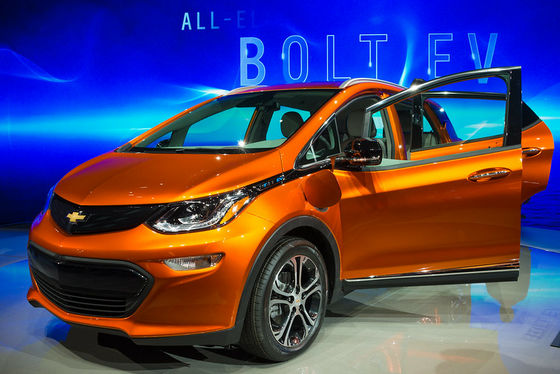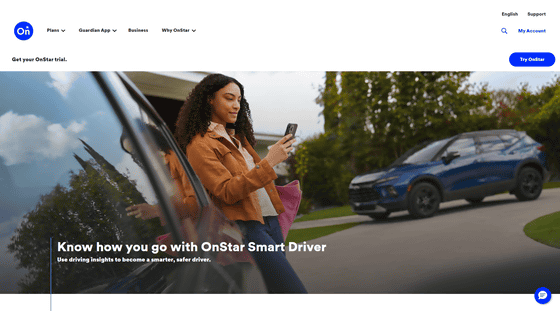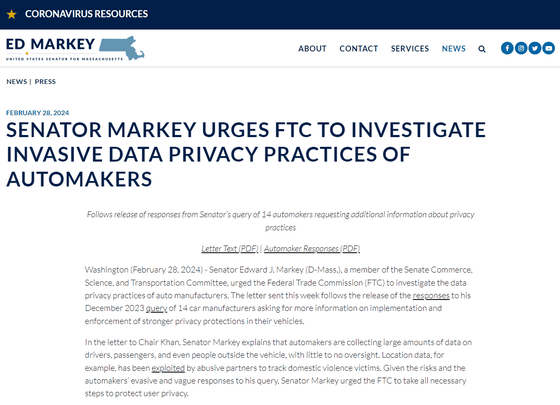It has been pointed out that manufacturers such as GM, Honda, Kia, and Hyundai are sharing driving data with insurance companies without explicit consent and are using it to review insurance premiums.

Connected cars, which have the ability to be constantly connected to the internet, acquire information about the vehicle's condition and surrounding road conditions and share the data through the network. This data is used to disseminate traffic information such as where traffic jams are occurring, but an investigation by The New York Times revealed that it was also shared with insurance companies and used to review insurance premiums. became.
Automakers Are Sharing Consumers' Driving Behavior With Insurance Companies - The New York Times

Automakers Secretly Collect Driving Data, Raising Insurance Premiums
Casimir Hill of The New York Times cited the case of Ken Dahl, who lives near Seattle.
Mr. Dahl, who drove a Chevrolet Volt, saw his premiums increase by 21% in 2022 and other insurance companies' quotes also increased. Mr. Dahl received information from a representative at an insurance company that it was based on a report from data broker LexisNexis, and requested disclosure of the report based on the law, and obtained the report from LexisNexis.
The report then includes the dates, start and end times of the 640 drives the Dahls have made in their Chevrolet Volt over the past six months, the distance traveled, speeding violations, and sudden braking or acceleration. It is said that the data on how many times it happened was recorded. The only thing missing was 'where you drove.'

by
'I feel betrayed,' Dahl told The New York Times. 'They shared information that I didn't know was going to be shared and screwed over my insurance review.' I am.
The data in question was provided by GM, the maker of the Chevrolet Bolt, and Dean Carney, a LexisNexis spokesperson, said the data was ``one of the factors that insurers use to create more personalized insurance offers.'' In fact, in February 2024, eight insurance companies requested LexisNexis to provide information on Mr. Dahl.
Hill said this kind of data provision is not limited to GM but is also being provided by other connected cars such as Honda, Kia, and Hyundai, and some drivers will end up with automakers providing their data to data brokers like LexisNexis. It points out that users often turn on features without realizing it.
In the case of GM, there is a feature called ``OnStar Smart Driver,'' but Hill says that there are cases where driving data is tracked whether the function is on or off, leading to an increase in insurance premiums.
OnStar Smart Driver | OnStar Service
https://www.onstar.com/services/smart-driver

'Customers benefit from the ability to learn more about safe driving behavior and vehicle performance,' GM spokesperson Marlo Lucic said of OnStar Smart Driver. 'Data is used with consent to obtain insurance quotes. Yes, you can unregister at any time.'' However, when Mr. Hill, who is a Chevrolet owner himself, checked the sign-up screen for ``OnStar Smart Driver,'' he found that a third party There was no mention of data being shared.
In response to inquiries, Lucic said OnStar Smart Driver is turned on at the time of vehicle purchase or through a mobile app, and drivers who say they haven't opted in may have been registered by their dealer without their knowledge. I answered yes. As for the reason why ``sometimes people are registered with dealers without their knowledge,'' Mr. Hill points out that GM's manual states that dealer salespeople will receive a bonus if they register for OnStar services, including ``OnStar Smart Driver.'' I am mentioning that there is a description.
In addition to the sharing of data with insurance companies, Senator Edward Markey has expressed concerns about the vast amount of data being collected by car companies, and has filed a complaint with the Federal Trade Commission (FTC). , is asking automakers to investigate their data policies and take the necessary actions to protect the privacy of all road users.
Senator Markey Urges FTC to Investigate Invasive Data Privacy Practices of Automakers

Related Posts:






